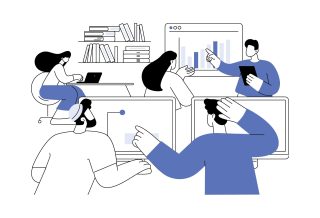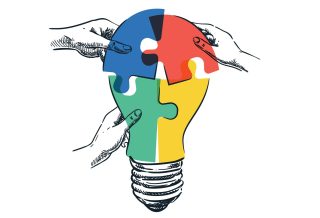IDEAS
Even coaches need coaches
By Serena Tyra, Brandon Sherman and Annela Teemant
Categories: Coaching, Collaboration, Facilitation, Fundamentals, Learning communities, Learning designs, Mentoring & inductionApril 2021
Read the remaining content with membership access. Join or log in below to continue.
Sed ut perspiciatis unde omnis iste natus error sit voluptatem accusantium doloremque laudantium, totam rem aperiam, eaque ipsa quae ab illo inventore veritatis et quasi architecto beatae vitae dicta sunt explicabo. Nemo enim ipsam voluptatem quia voluptas sit aspernatur aut odit aut fugit, sed quia consequuntur magni dolores eos qui ratione voluptatem sequi nesciunt. Neque porro quisquam est, qui dolorem ipsum quia dolor sit amet, consectetur, adipisci velit, sed quia non numquam eius modi tempora incidunt ut labore et dolore magnam aliquam quaerat voluptatem.
ENDURING PRINCIPLES OF LEARNING
JOINT PRODUCTIVE ACTIVITY
Teachers and Students Producing Together
Facilitate learning through joint productive activity among teacher and students.
Enacting level: The teacher and a small group of students collaborate on a shared product.
LANGUAGE AND LITERACY DEVELOPMENT
Developing Language and Literacy Across the Curriculum
Develop competence in the language and literacy of instruction across the curriculum.
Enacting level: The teacher provides structured opportunities for students to engage in sustained reading, writing, or speaking activities and assists academic language use or literacy development by questioning, rephrasing, or modeling.
CONTEXTUALIZATION
Making Meaning: Connecting School to Students’ Lives
Connect teaching and curriculum to experiences and skills of students’ home and community.
Enacting level: The teacher integrates the new activity/information with what students already know from home, school, or community.
CHALLENGING ACTIVITIES
Teaching Complex Thinking
Challenge students toward cognitive complexity.
Enacting level: The teacher designs and enacts challenging activities with clear standards and performance feedback and assists the development of more complex thinking.
INSTRUCTIONAL CONVERSATION
Teaching Through Conversation
Engage students through dialogue, especially the Instructional Conversation.
Enacting level: The teacher has a planned, goal-directed conversation with a small group of students on an academic topic; elicits student talk by questioning, listening, and responding to assess and assist student understanding; and inquires about students’ views, judgments, or rationales. Student talk occurs at higher rates than teacher talk.
CRITICAL STANCE
Teaching to Transform Inequities
Empower students to transform society’s inequities through democracy and civic engagement.
Enacting level: The teacher consciously engages learners in interrogating conventional wisdom and practices, reflecting upon ramifications, and seeking actively to transform inequities within their scope of influence in the classroom and larger community.
References
Burkins, J.M. & Ritchie, S. (2007). Coaches coaching coaches. Journal of language and literacy education, 3(1), 32-47.
McClure, C.T. (2008). Teaching and learning for all. Teachers Teaching Teachers, 3(8), 10–11.
Teemant, A. (2018). Sociocultural theory as everyday practice: The challenge of K-12 teacher preparation for multilingual and multicultural learners. In J. Lantolf & M. Poehner (Eds.), The Routledge handbook of sociocultural theory and second language development (pp. 529–550). Routledge.
Teemant, A. (2018). Sociocultural theory as everyday practice: The challenge of K-12 teacher preparation for multilingual and multicultural learners. In J. Lantolf & M. Poehner (Eds.), The Routledge handbook of sociocultural theory and second language development (pp. 529–550). Routledge.
Categories: Coaching, Collaboration, Facilitation, Fundamentals, Learning communities, Learning designs, Mentoring & induction
Recent Issues
LEARNING DESIGNS
February 2025
How we learn influences what we learn. This issue shares essential...
BUILDING BRIDGES
December 2024
Students benefit when educators bridge the continuum of professional...
CURRICULUM-BASED PROFESSIONAL LEARNING
October 2024
High-quality curriculum requires skilled educators to put it into...
LEARNING TO PIVOT
August 2024
Sometimes new information and situations call for major change. This issue...















